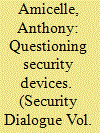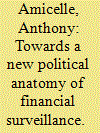| Srl | Item |
| 1 |
ID:
140511


|
|
|
|
|
| Summary/Abstract |
Algorithms, biometrics and body scanners, computers and databases, infrastructures of various kinds, ranging from what is commonly referred to as ‘hi-tech’ to ‘low-tech’ items such as walls or paper files, have garnered increased attention in critical approaches to (in)security. This article introduces a special issue whose contributions aim to further these approaches by questioning the role and political effects of security devices. It proposes an analytics of devices to examine the configuration and reconfiguration of security practices by attending to the equipment or instrumentation that make these practices possible and temporally stabilize them. The aim here is not to advance devices as a new unit of analysis, but to open new forays in ongoing debates about security politics and practices, by asking different research questions and developing new research angles. We start by outlining what is at stake when thinking of and analysing security practices through devices, or shifting from the language of technology and ‘technologies of security’ to security devices. The remainder of the article then specifies how an analytics of devices involves a more varied vocabulary of performativity, on the one hand, and agency, on the other.
|
|
|
|
|
|
|
|
|
|
|
|
|
|
|
|
| 2 |
ID:
105942


|
|
|
|
|
| Publication |
2011.
|
| Summary/Abstract |
This article examines dynamics of financial surveillance and risk-based regulation in the context of ongoing activities to combat money laundering and terrorist financing. Close analysis of the situation in the UK reveals entangled forms of co-regulation and ultimately co-production of surveillance that challenge 'institutional boundaries' of the state regarding policing and intelligence practices. It is argued that ongoing transformations in the anti-money laundering field reveal a dual movement that combines forms of indirect administration with a process of 'neoliberal bureaucratization'. The article aims to show how current policies against 'dirty money' still paradoxically work on the basis of heterogeneous goals and misapprehensions between 'professionals of security' and 'professionals of finance'.
|
|
|
|
|
|
|
|
|
|
|
|
|
|
|
|